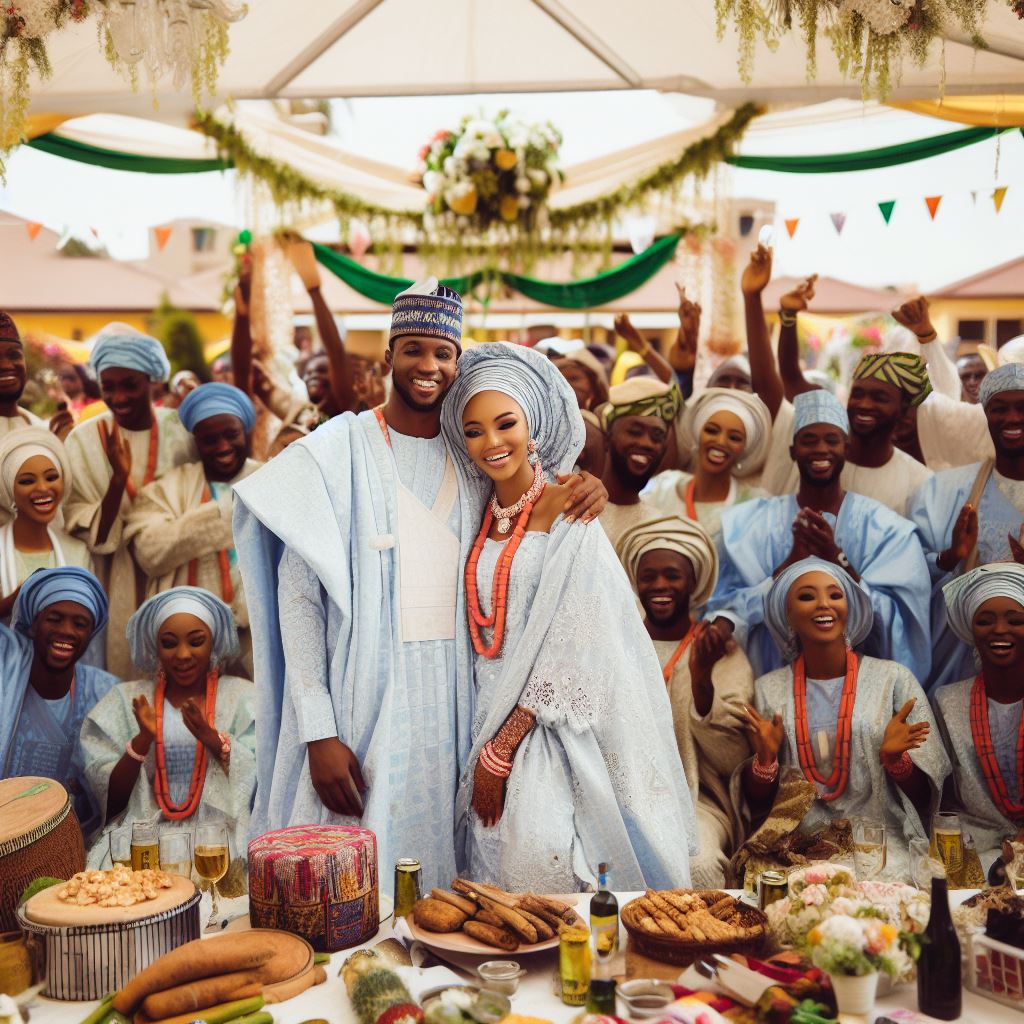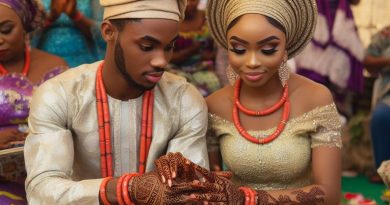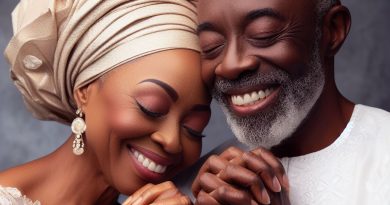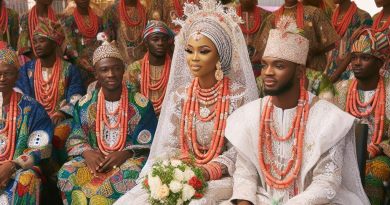Celebrating Diversity: The Many Faces of Marriage in Nigeria
Last Updated on October 26, 2023
Introduction
The concept of marriage in Nigeria
Marriage in Nigeria is a cultural tradition that holds great value and significance.
It is a sacred union between two individuals who commit to love, support, and cherish each other for a lifetime.
Nigerian society is composed of various cultural and ethnic groups, each with its unique customs and practices surrounding marriage.
The diverse cultural and ethnic groups in Nigeria
The Yoruba, Igbo, Hausa, and other prominent ethnic groups in Nigeria have distinct wedding ceremonies that showcase their rich cultural heritage.
These ceremonies are often grand events that involve elaborate rituals, music, dance, and vibrant traditional attires.
They provide an opportunity for families to display their wealth, social status, and demonstrate their commitment to cultural heritage.
The diversity of marriage practices in Nigeria contributes to a rich and vibrant cultural heritage
The diversity of marriage practices in Nigeria is truly remarkable.
While some communities practice polygamy, where a man can have multiple wives, others follow a monogamous system.
Additionally, the initiation rites and procedures leading up to the wedding day differ across cultures.
The richness of these customs fosters a sense of pride and belonging among Nigerians and contributes to the cultural fabric of the nation.
In essence, the celebration of diversity in marriage practices helps strengthen the bonds between different ethnic groups in Nigeria.
It promotes understanding, tolerance, and acceptance among communities that might otherwise have differences or conflicts.
By recognizing and embracing the diverse ways in which Nigerians celebrate marriage, society as a whole benefits from a deeper appreciation of its collective cultural heritage.
To summarize, the diversity of marriage practices in Nigeria adds to the country’s rich and vibrant cultural heritage.
The various customs and traditions associated with marriage showcase the unique identities of different ethnic groups, fostering a sense of pride and unity.
Embracing this diversity promotes cultural appreciation and contributes to the overall social fabric of Nigeria.
Traditional Marriage Practices
Importance of Traditional Marriage Practices in Nigeria
- Traditional marriage practices hold a significant role in Nigeria as they reflect cultural values and strengthen communities.
- These practices promote social cohesion, preserve cultural heritage, and reinforce family ties.
Specific Marriage Customs and Ceremonies from Various Nigerian Cultures
Yoruba Culture
- The Yoruba traditional engagement involves the groom’s family presenting gifts to the bride’s family.
- The couple exchanges kolanuts as a symbol of unity and respect during the ceremony.
Igbo Culture
- The Igbo traditional wedding includes the “Iku Aka” or “Knocking on the Door” ceremony.
- This involves the groom and his family officially asking the bride’s family for her hand in marriage.
Hausa Culture
- In Hausa traditional weddings, the Fatiha ceremony takes place, which is the Islamic marriage contract signing.
- The bride’s friends and family shower her with henna and gifts during the Kamu (wedding procession) ceremony.
Tiv Culture
- In Tiv culture, the groom-to-be and his family visit the bride’s family with a gift of yams.
- The yams symbolize fertility, and their acceptance signifies the approval of the marriage.
Significance of Bride Price and Dowry in Traditional Nigerian Weddings
Bride Price
- Bride price refers to the amount of money or goods given by the groom’s family to the bride’s family.
- It showcases the groom’s ability to take care of his wife and ensures that the bride is valued and respected.
Dowry
- Dowry is the wealth or property that a bride brings to her husband upon marriage.
- It serves as financial security for the wife and fosters a sense of responsibility in the husband.
Significance
- Both bride price and dowry contribute to the economic stability of families involved in traditional wedding ceremonies.
- They also symbolize the bond between the families and demonstrate the commitment of the groom to support his new wife.
In summary, traditional marriage practices in Nigeria play a crucial role in preserving cultural heritage, strengthening community bonds, and celebrating diversity.
Each Nigerian culture has its unique customs and ceremonies that contribute to the richness of marriage traditions.
The concepts of bride price and dowry further emphasize the importance of family, respect, and financial security in traditional Nigerian weddings.
By embracing and celebrating these practices, Nigerians can honor their cultural identity while embracing a diverse and inclusive society.
Read: Success Stories: Nigerian Couples Transformed by Counseling
Religious Influences on Marriage
The major religions in Nigeria and their influence on marriage
- In Nigeria, the major religions are Islam, Christianity, and African Traditional Religions (ATRs).
- Each religion has its own set of beliefs and practices that greatly influence the institution of marriage.
- Islam is practiced by the Hausa-Fulani, Yoruba, and Kanuri ethnic groups, and it accounts for a significant portion of the Nigerian population.
- In Islamic marriages, the consent of both the bride and groom is required, and the groom is expected to pay a bride price.
- Christianity, introduced by the British during colonial rule, is now widely practiced in Nigeria.
- Christian weddings in Nigeria are often elaborate affairs, with ceremonies held in churches and followed by extravagant receptions.
- The African Traditional Religions (ATRs) have their roots in the indigenous cultures and beliefs of the various ethnic groups in Nigeria.
- ATR practices vary across different ethnic groups, but they usually involve rituals and ceremonies to bless the union and ensure its success.
How Islamic traditions impact Muslim weddings in Nigeria
- Islamic weddings in Nigeria are influenced by the teachings of the Quran and the Hadith, which are seen as sacred scriptures.
- The wedding ceremony typically takes place in the presence of a religious leader, such as an Imam.
- Before the wedding, the groom must provide a dowry to the bride, which symbolizes his commitment and financial responsibility.
- The Nikah, or marriage contract, is a crucial part of the Islamic wedding ceremony and outlines the rights and responsibilities of both the bride and groom.
- During the ceremony, the couple exchanges vows and rings, and their union is celebrated with prayers, readings from the Quran, and supplications.
Christian’s wedding customs and traditions in Nigeria
- Christian weddings in Nigeria often blend traditional customs with religious practices.
- The ceremony is typically held in a church, with the bride and groom exchanging vows and rings in the presence of a minister or priest.
- There are various Christian denominations in Nigeria, such as Catholic, Anglican, Pentecostal, and Methodist, each with its unique wedding customs.
- In Catholic weddings, the couple participates in the Sacrament of Holy Matrimony, which is believed to be a lifelong covenant before God.
- Anglican weddings often involve the couple receiving blessings from the priest and exchanging wedding vows in front of the congregation.
- Pentecostal and Methodist weddings often feature lively praise and worship sessions, along with sermons and prayers for the couple’s future together.
- Regardless of the denomination, Christian weddings in Nigeria emphasize the importance of commitment, love, and fidelity in marriage.
Religious influences play a significant role in shaping the diverse landscape of marriage in Nigeria.
Whether it be through Islamic traditions or Christian customs, the beliefs and practices of these religions greatly impact the way marriages are conducted and celebrated in the country.
Read: Romantic Pidgin Phrases for Your Wedding Anniversary

Interethnic and Interracial Marriages
The increasing trend of interethnic and interracial marriages in Nigeria
- The face of marriage in Nigeria has undergone a significant transformation in recent years.
- Interethnic and interracial marriages are becoming increasingly common across the country.
- This trend can be attributed to factors like urbanization, globalization, and increased cultural exposure.
- Young Nigerians are more open-minded and willing to cross ethnic and racial barriers in their search for love.
- Interethnic and interracial marriages are breaking down stereotypes and promoting unity among different ethnic groups.
- The acceptance of interethnic and interracial marriages reflects Nigeria’s diverse and multicultural society.
The challenges and advantages of interethnic marriages in Nigeria
- Interethnic marriages come with their fair share of challenges.
- Language barriers, cultural differences, and religious beliefs can pose difficulties for couples.
- Both partners must make an effort to understand and respect each other’s backgrounds.
- Family and societal pressure can be a significant challenge, as some ethnic groups still frown upon interethnic marriages.
- However, interethnic marriages also bring many advantages to the couples involved.
- They provide an opportunity for cultural exchange and learning, fostering greater understanding between different ethnic groups.
- Interethnic marriages contribute to the creation of a more inclusive society, breaking down barriers and promoting harmony.
- Children from interethnic marriages grow up with a unique blend of cultural influences, making them more open-minded and tolerant.
The cultural fusion and exchange that occurs in interethnic marriages.
- One of the most beautiful aspects of interethnic marriages is the cultural fusion that takes place.
- Couples learn from each other’s traditions, customs, and celebrations, creating a rich tapestry of shared experiences.
- Food, language, music, and clothing are just a few examples of the cultural elements that intertwine in interethnic marriages.
- These marriages foster a deeper appreciation for diversity and highlight the beauty of different cultures.
- The fusion of traditions can lead to the creation of new rituals and customs unique to each individual couple.
- Interethnic marriages also promote a sense of pride in one’s ethnic heritage while embracing and celebrating the traditions of their partner.
In a nutshell, interethnic and interracial marriages are on the rise in Nigeria, reshaping the face of marriage in the country.
Despite the challenges they may face, these marriages bring numerous advantages, such as cultural exchange, inclusivity, and unity among ethnic groups.
They create a platform for understanding and appreciation of diverse traditions and foster a more tolerant and accepting society.
Interethnic marriages celebrate the beauty of diversity while forging bonds between two individuals from different backgrounds.
Read: From First to Fiftieth: Nigerian Anniversary Milestones
Same-Sex Marriage and LGBTQ+ Rights
Same-sex marriage is a highly controversial topic in Nigeria, stirring intense emotions and conflicting opinions.
The legal and social challenges faced by LGBTQ+ individuals in Nigeria
LGBTQ+ individuals in Nigeria face significant legal and social challenges due to the country’s conservative cultural and religious beliefs.
Legal Challenges
- LGBTQ+ relationships are criminalized under the Same-Sex Marriage Prohibition Act of 2013.
- Same-sex couples are not recognized, and those found guilty can face imprisonment of up to 14 years.
- This legislation has created a hostile environment for LGBTQ+ individuals, subjecting them to discrimination and violence.
Social Challenges
- LGBTQ+ individuals often experience stigmatization, rejection, and isolation from their families and communities.
- They face discrimination in employment, housing, healthcare, and education.
- Homophobia is prevalent, and violence against LGBTQ+ individuals is not uncommon.
- Fear of persecution and societal judgment forces many LGBTQ+ individuals to hide their true identity.
The ongoing debates surrounding LGBTQ+ rights in Nigeria
The issue of LGBTQ+ rights in Nigeria continues to fuel heated debates and polarize the society.
Religious and Cultural Beliefs
Many Nigerians strongly adhere to conservative religious and cultural beliefs that condemn homosexuality.
This creates a significant barrier to acceptance and understanding of LGBTQ+ individuals and their rights.
Human Rights Advocacy
Advocacy groups within Nigeria and worldwide are actively pushing for the recognition of LGBTQ+ rights.
They argue that every individual, regardless of sexual orientation, deserves equal treatment under the law.
Political Stance
Nigerian politicians hold differing views on LGBTQ+ rights due to their allegiance to constituents and religious affiliations.
Some politicians vehemently oppose, while others silently support or abstain from openly discussing the issue.
International Pressure
International organizations and foreign governments have criticized Nigeria’s stance on LGBTQ+ rights.
They argue that the criminalization of same-sex relationships violates basic human rights.
In short, the topic of same-sex marriage and LGBTQ+ rights in Nigeria remains a complex and contentious subject.
While the legal and social challenges faced by LGBTQ+ individuals persist, ongoing debates provide hope for progress.
Increased awareness, education, and advocacy may eventually lead to a more inclusive and accepting society in Nigeria.
Read: Incorporating Folktales in Your Nigerian Anniversary Note
Modern Trends and Western Influences
In recent years, modernization and globalization have brought about significant changes in marriage practices in Nigeria.
The influence of Western culture has been particularly notable in Nigerian weddings, with the adoption of various Western traditions and customs becoming increasingly popular.
Impact of Modernization and Globalization
Modernization refers to the process of adapting to modern ways of life and advancements in technology, while globalization signifies the integration of different cultures and societies on a global scale.
These two forces have greatly impacted marriage practices in Nigeria.
One notable change resulting from modernization and globalization is the increased emphasis on individualism and personal choice in selecting a marriage partner.
In the past, arranged marriages were more prevalent, where parents and extended family members played a significant role in choosing a spouse for their children.
However, with modernization, Nigerians now have more freedom to pursue relationships based on love, compatibility, and personal preferences.
Generally, globalization has facilitated the exchange of ideas and cultural practices between different countries, including Nigeria and Western societies.
This exchange has influenced Nigerian weddings, as couples now have access to a myriad of Western wedding trends and traditions through various media platforms.
Influence of Western Culture
Western culture has had a profound impact on Nigerian weddings, transforming them into elaborate and extravagant celebrations.
The influence of Western weddings can be seen in various aspects, including the bridal attire, wedding ceremonies, and reception styles.
One significant influence is the adoption of the white wedding gown, which is a staple in Western weddings.
Nigerian brides have embraced this tradition and incorporated it into their own wedding ceremonies, often pairing it with traditional Nigerian accessories and fabrics.
Additionally, the concept of a bridal party or bridesmaids, which originated from Western culture, has gained popularity in Nigerian weddings.
Brides now have a group of close friends and family members who assist them in the planning and execution of the wedding, adding a sense of unity and support to the celebration.
Western-style wedding cakes have also become a common feature in Nigerian weddings, with couples opting for multi-tiered cakes adorned with intricate designs and fondant icing.
This trend reflects the influence of Western confectionery traditions and aims to create visually stunning centerpieces for the wedding reception.
Adoption of Western Wedding Traditions and Customs
With the increasing exposure to Western wedding ideals, Nigerian couples have embraced various Western traditions and customs, blending them with their own cultural practices.
This adoption of Western elements has created a unique fusion that showcases the diversity of Nigerian marriages.
For example, the exchange of wedding rings, commonly associated with Western weddings, has become a prevalent practice in Nigerian ceremonies.
This tradition has been seamlessly incorporated into Nigerian culture, symbolizing the couple’s commitment and unity.
Another Western influence is the introduction of pre-wedding photoshoots and engagement parties.
Nigerian couples now often engage professional photographers to capture stunning images of their love story and share them with family and friends on social media platforms.
Furthermore, the concept of destination weddings, traditionally associated with Western weddings, has gained popularity among Nigerian couples.
Choosing exotic locations for wedding ceremonies provides a unique and memorable experience for both the couple and their guests.
To sum it up, modernization and globalization have had a profound impact on marriage practices in Nigeria, leading to the adoption of Western wedding traditions and customs.
The influence of Western culture can be seen in various aspects of Nigerian weddings, from the attire and ceremonies to the incorporation of Western confectionery and photography trends.
This fusion of traditions showcases the diversity and evolving nature of Nigerian marriages, celebrating the many faces of love and commitment in the country.
Conclusion
Diverse faces of marriage in Nigeria.
In Nigeria, marriage customs vary across the country, reflecting the rich cultural diversity of the nation.
Traditional marriage practices such as Igbo’s “Igba Nkwu” and Yoruba’s “Engagement Ceremony” showcase the unique traditions of different ethnic groups.
Additionally, religious ceremonies like Muslim Nikah and Christian weddings contribute to the multifaceted nature of marriage in Nigeria.
The importance of celebrating and preserving these various marriage practices.
It is vital to recognize and embrace the different faces of marriage in Nigeria to foster unity and understanding among communities.
Preserving these customs promotes cultural heritage and strengthens the social fabric of the nation.
By respecting and valuing diverse marriage practices, Nigeria can experience harmony and inclusivity in its society.
Final thoughts on the significance of diversity in Nigerian marriage customs.
Embracing diversity in marriage customs not only enriches individual lives but also benefits the entire nation.
It allows for the preservation of cultural values, promotes inter-ethnic and inter-religious harmony, and creates a stronger sense of national identity.
Nigerians should celebrate and appreciate the many faces of marriage, as they are integral to the country’s cultural tapestry and collective heritage.


